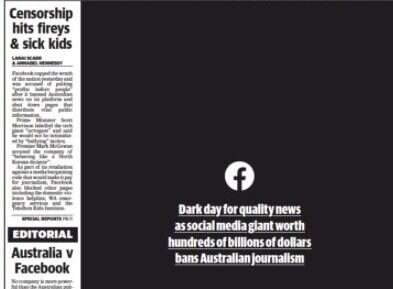
There was one story on Australian newspaper front pages as publishers united to condemn the Facebook Australia news ban.
The West Australian published a blackout across most of its front page with the headline: “Dark day for quality news as social media giant worth hundreds of billions of dollars bans Australian journalism.”
In a front-page comment which was echoed in other titles, it said: “No company is more powerful than the Australian public. Facebook may have ‘friends… Well, Aussies have mates.
“The US tech giant that pays little tax will find out quickly its ill-conceived negotiating tactic over draft media laws won’t work. News companies and the Federal Government (and Opposition and minor parties) won’t blink.
“And the Aussie public will ask the simple question of how another tech giant in Google could announce several genuine partnerships with media companies that put a value on quality original journalism, especially in regional WA, at the same time Facebook went nuclear and banned the news.”
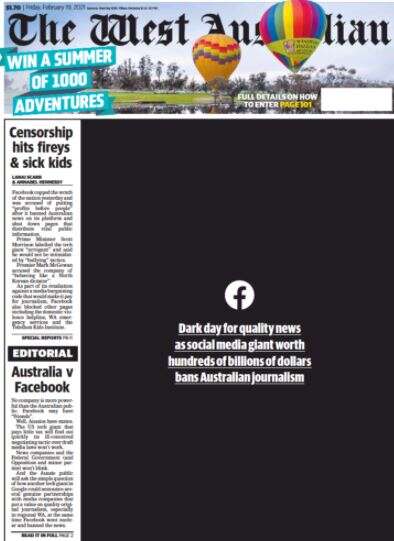
Some 17m Australians per month, out of a population of 25m, use Facebook. Over the past three years, the tech giant has made $1.7bn (Aus) in revenue ($1.33bn US) and paid tax of $40.3m (Aus) ($31.5m US).
Facebook removed news content from its service on Wednesday in response to the Australian government’s plan to implement a News Media Bargaining Code which will force Google and Facebook to make payments to news publishers. Press Gazette analysis shows the two tech giants, which have a duopoly position over online advertising, are facing a regulatory backlash around the world.
Early data from New York-based analytics firm Chartbeat has found that traffic to Australian news websites has already dipped by around 13%.
Australia’s Courier Mail today gave Facebook a “thumbs down” on its front page and is one of several titles to lead with a picture of Brisbane mother Hannah Clarke.

She was killed a year ago, along with her three children, by an ex-partner. A domestic abuse charity set up in her name was one of a number of non-news Facebook pages deleted by the tech giant.
Other Australian Facebook pages blocked include those of charities, universities and the Bureau of Meteorology.
Hetty Johnston, founder of child protection group Bravehearts, told the paper her page was shut down on Thursday. “There is too much at stake, ” she said.
“What if a child goes missing today, what then? Facebook is basically refusing to put out amber alerts.
“They’re affecting human lives with their nonsense, it’s just outrageous. They’ve completely abrogated their responsibility to the community.”
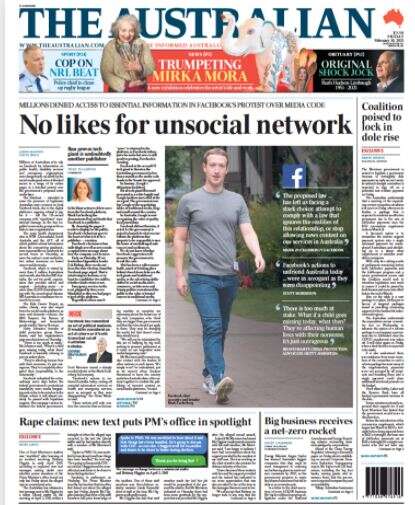
Leading Australian news anchor Ticky Fullerton writing for The Australian said: “In his blunt action to delete news from the Facebook platform, Mark Zuckerberg has demonstrated beyond doubt that Facebook is a publisher. By choosing the pages it wants to display for the public, Facebook’s behaviour goes to the heart of what is it to be a publisher — curation.
“Facebook’s decision to ban individuals as well as news sends a capital letter message about how the company sees its users. Early on Thursday, West Australian Opposition Leader Zak Kirkup, three weeks out from the state election, found his Facebook page wiped. That is interfering in elections, or at least for a publisher it would be, whether inadvertent or not.”
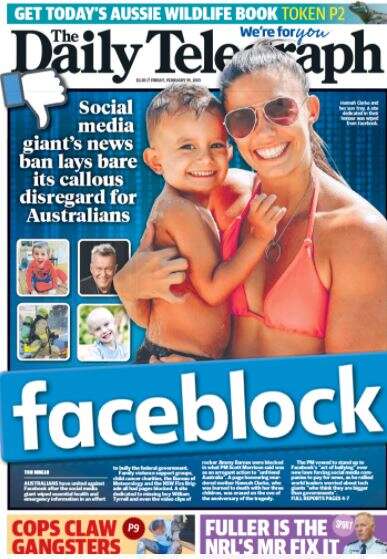
In its editorial, the Australian Daily Telegraph said: “The mask is off. Following Facebook’s widespread erasure of Australian pages from its platform, we now see exactly who and what we are dealing with.
“Forget Facebook CEO Mark Zuckerberg’s previously declared aims of ‘protecting our community from abuse and hate, defending against interference by nation states’ and ‘making sure that time spent on Facebook is time well spent’.
“Replace those lofty ideals with an awareness that Facebook is a ruthless trillion-dollar entity prepared to sweep an entire nation aside if it doesn’t get its way. Invited to negotiate terms over its currently unpaid use of news content, Facebook has responded by shutting down not only news pages but also pages run by charities, government health sites, emergency services, animal rescue organisations and hospitals, among many others.”
The Herald Sun led with the headline: “Anti-social network” and “fakebook”.
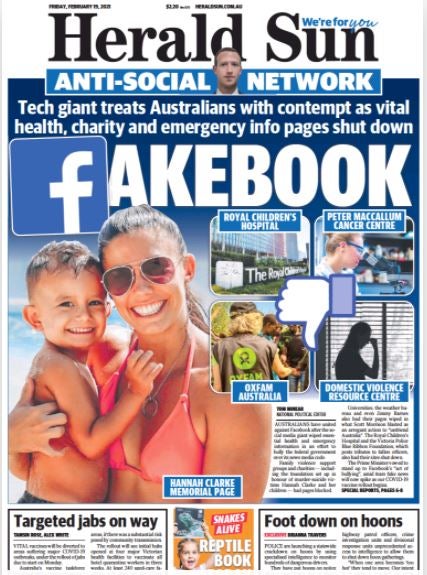
The move by Facebook made headlines around the world, and was also front-page news for The Guardian and Metro in the UK, the latter running with a #delete Facebook front page.
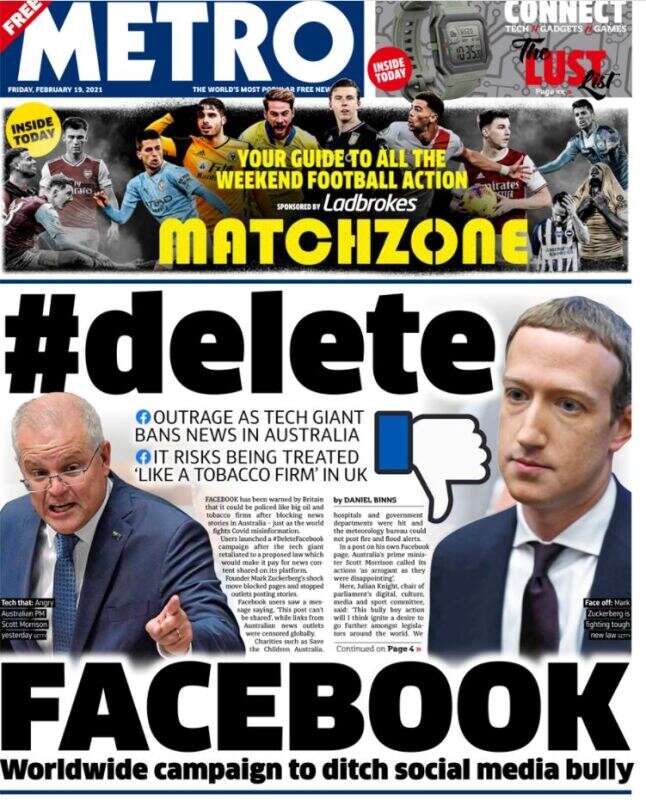
Publishers in Canada are following events in Australia closely and are also lobbying for Australia-style news payments from Big Tech.

Under the headline “Defanging big tech”, Navneet Alan of the Toronto Star wrote: “Facebook has continually strung along news companies with promises of tools to help news survive while never coming through, all the while lobbying against any sort of regulation and generally avoiding consequences.
“So consider: When Facebook pulled the plug this week, it not only took down news pages in the middle of a pandemic, it also inadvertently took down social pages that give updates on things like bushfires and hurricanes.
“With that in mind, the whole complicated question becomes much more simple: For now, Facebook has become the default gateway to online information for much of the world. Its decision to unilaterally cut off a significant avenue to information for an entire country points to everything wrong with the company: Its hubris, its commitment only to itself while insisting it is responsible, its adherence to the profit motive and laissez-faire capitalism above all.
“And so the question of how or if to regulate Big Tech is made clear by the reaction of Big Tech itself. We cannot allow our public sphere and the place of journalism and news in our society to be dictated and controlled by a handful of American companies whose actions run counter to their every stated public ideal. Yes, there is room to debate what is to be done, but it could not be clearer that something must in fact be done, and soon.”
Facebook’s response to criticism of the Australia news ban
Facebook vice president for Europe, Middle East and Africa Nicola Mendelsohn said: “This is not a decision that we entered into lightly. We have been in conversations with the Australian government for a number of years but they have brought in legislation that sets a precedent where governments can decide who enters into a news content agreement and ultimately how much a publisher gets paid.
“Publishers – newspapers, broadcasters – can voluntarily choose to put their content onto Facebook and they choose to do so because they benefit from it. I want to be really clear here that Facebook doesn’t steal, take or copy news content. Publishers choose to put their stories on our news feed because it allows them to sell more subscriptions, it allows them to grow their audiences, and ultimately to increase advertising revenue. The issue here is with the law itself, and why we were forced to take the steps that we did, because it penalises Facebook for content that it didn’t take or didn’t ask for, and we think it’s an unworkable precedent.
“The UK has taken a very different approach, and that’s allowed us to launch something that we call Facebook News just last month, which is a really substantial investment into UK journalism. We’ve had hundreds of publishers – big ones, small ones, across the country – come on to join the tab, a dedicated place for news, to help them find new audiences and make money from it. So we’re really excited that the UK is leading the world, I would say, in the area of putting quality news out to wider audiences through our platforms.
“What I want to be really clear about is that we have a commitment to investing in quality news, and that hasn’t changed. We understand that what [news organisations] are doing is providing a very important role in society and in democracy. So that’s why we’ve expanded Facebook News; that’s why we’ve also extended the Community News Project here in the UK, and that funds 80 trainee reporters in local newsrooms across the country. So, we’re very much in support of working closely with publishers.”
Email pged@pressgazette.co.uk to point out mistakes, provide story tips or send in a letter for publication on our "Letters Page" blog
